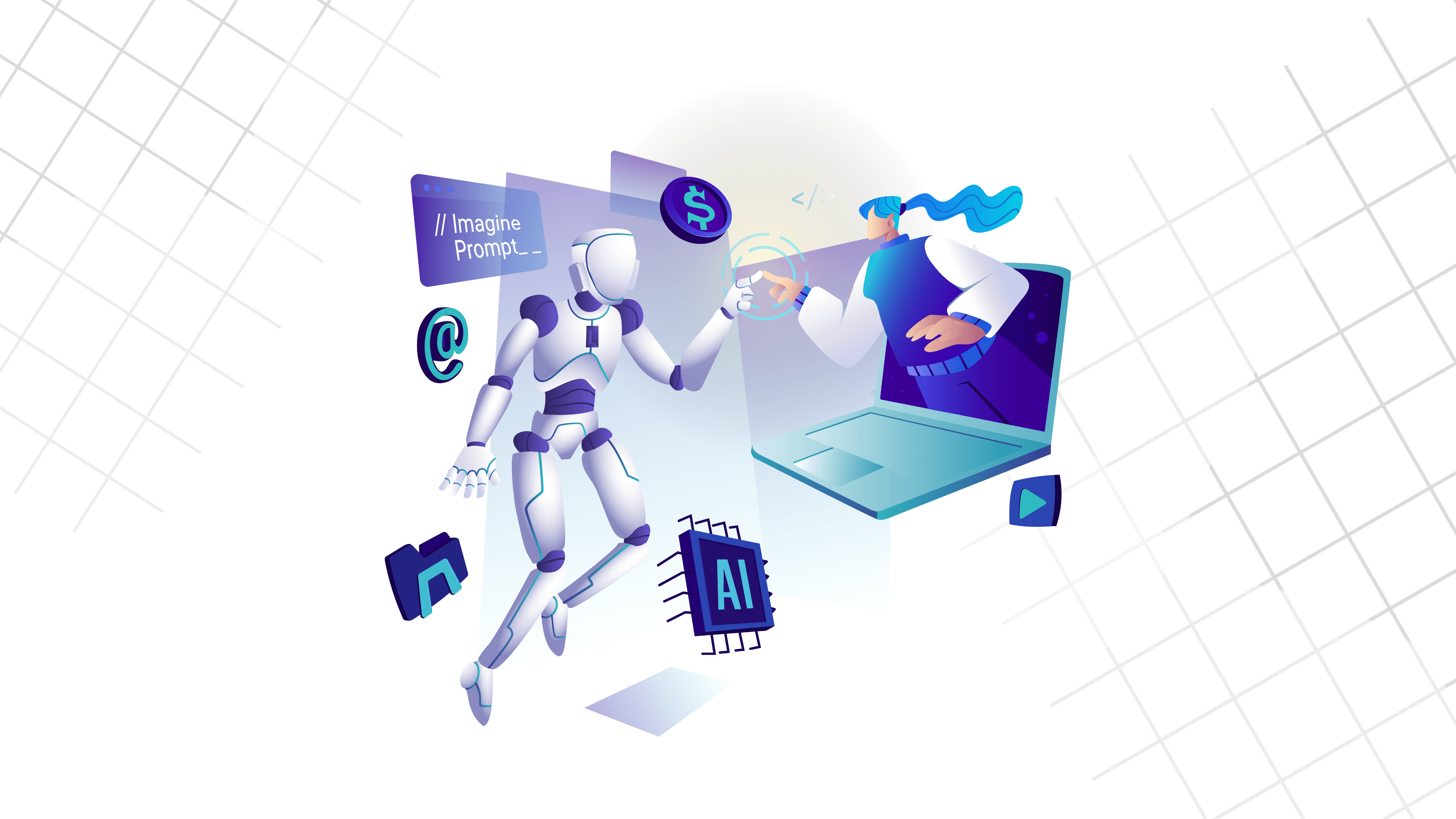How AI Chatbot Assistants Transform Businesses - Top 6 Real Use Cases of AI Chatbot Implementation
Wed, Jan 3, 2024 •7 min read
Category: Business Stories
In the rapidly evolving digital innovation landscape, AI chatbot assistants are emerging as powerful catalysts for change across various industries. Let's explore how these intelligent assistants revolutionize operations and drive unparalleled benefits in various sectors.
AI chatbots leverage a spectrum of advanced AI technologies, like machine learning for refined responses, natural language processing (NLP), and natural language understanding (NLU) to precisely decipher user inquiries and align them with specific intents. With deep learning capabilities, AI chatbots continuously enhance accuracy, fostering natural and seamless interactions. This iterative learning process makes human-AI interactions more intuitive, with a communication style that flows effortlessly without the risk of misunderstandings over time. Let’s see how AI chatbots can enhance productivity, customer satisfaction, and efficiency across multiple industries.
Must-know AI Chatbot Stats
Let’s start with some numbers to support our claims and emphasize the importance of the AI industry. AI is not just a technology; it's a transformative force reshaping the dynamics of human-machine interaction. Chatbots, wielding the power of conversational AI, have proven instrumental in driving sales, boasting an average increase of 67%. This isn't just about revenue; it's about the efficacy of chatbots in closing deals, with 35% of business leaders crediting them for successful transactions.
Investment in conversational AI is witnessing a surge, evident in the rising number of mergers and acquisitions in the sector. The global chatbot market, valued at $370 million in 2017, is expected to reach $29.8 billion by 2028. By 2025, the entire AI market is projected to reach a staggering $190 billion, underlining the sheer magnitude of its impact.
However, trust remains a critical factor. A significant 39% of respondents in the United States express reluctance to entrust AI voice assistants with making phone calls, emphasizing the importance of building trust in the evolving landscape of conversational AI.
On the other hand, customers seem to be ready for the future. Over 50% expect businesses to be available 24/7, and more than 40% don't mind whether they're assisted by an AI tool or a human, as long as their questions are answered.

The corporate realm is acknowledging the transformative power of conversational AI. According to the PWC 2022 AI Business Survey, CEOs, with 40% identifying the improvement of employee experiences and 37% focused on enhancing consumer experiences, are steering their companies toward a more AI-powered future.
Conversational AI, potentially reducing customer service costs by up to 40%, is not just a cost-effective solution but a catalyst for improved customer experiences. As businesses stand on the precipice of this technological revolution, embracing the power of conversational AI is not just an option — it's a strategic imperative. Let’s see real-life examples of AI chatbot implementation in various industries.
Retail and E-Commerce: A Seamless Shopping Experience
In the retail and e-commerce sector, AI chatbot assistants are reshaping the customer journey. Picture a virtual assistant guiding users through product selections, answering queries, and even facilitating purchases without human intervention. By providing instant responses and personalized interactions, these chatbots elevate customer satisfaction, streamline transactions, and enhance the overall shopping experience.
Real-Life Use Case: AI Chatbot in E-commerce
Sephora Singapore strategically blended physical and digital experiences using conversational AI, introducing a virtual assistant for personalized beauty consultations and in-store-like interactions online. This move resulted in over 9,000 users, 332,000+ conversation sessions, and an average monthly revenue increase of $30,000 within a year. The virtual assistant's success challenges the notion that chatbots are solely for complaint resolution, highlighting their potential in upselling and cross-selling. Sephora's adept use of generative AI stands as a successful model, showcasing the technology's potential to redefine customer engagement in the retail sector.

Healthcare: Personalized Patient Support
In healthcare, the role of AI chatbot assistants extends beyond administrative tasks. These chatbots assist in appointment scheduling, provide medication reminders, and offer basic health information. By delivering personalized and context-aware responses, they create a supportive and engaging patient environment, ultimately contributing to improved healthcare experiences.
Real-Life Use Case: AI Chatbot in Healthcare
Megi Health, a digital healthcare startup faced the challenge of enhancing patient care and optimizing medical staff efficiency. Recognizing the potential of technology, Megi Health created a secure and user-friendly digital platform to provide 24/7 support to chronic patients. Leveraging WhatsApp, the platform introduced a virtual assistant, streamlining patient interactions and achieving objectives. The chatbot facilitates two-way data exchange, allowing patients to submit readings and receive immediate feedback, connecting them with a doctor when necessary. Results include an 86% CSAT score and a remarkable 65% reduction in data collection time, demonstrating the transformative impact of AI in healthcare.
Legal Services: Simplifying Legal Processes
Legal services benefit from the efficiency of AI Chatbot Assistants in simplifying legal processes. These chatbots provide basic legal information, guide users through legal procedures, and offer support in understanding legal documentation. This streamlines the legal service workflow, making legal assistance more accessible and user-friendly.
To see a real-life example of an AI chatbot for the legal industry, please review our case study.
Travel and Hospitality: Bridging Language Gaps Globally
For the travel and hospitality industry, language barriers can be a significant hurdle to global expansion. AI Chatbot Assistants break down these barriers by offering multilingual support. They assist users in various languages, facilitating bookings, providing travel information, and ensuring a seamless experience for travelers worldwide.
Real-Life Use Case: AI Chatbot in Travel
Gol Airlines, a prominent South American airline, faced challenges in addressing customer inquiries, particularly those related to COVID-19 restrictions. To overcome this, they introduced Gal, a virtual assistant providing round-the-clock customer support. With an impressive 85% retention rate, Gal autonomously handled 90% of 900,000 inquiries. The virtual assistant streamlined interactions, offering passengers increased visibility into important information. This successful implementation showcases Gal's efficiency in addressing customer queries, improving the overall customer experience for Gol Airlines.
Real Estate: Transforming Lead Generation and Property Searches
In real estate, AI chatbots become invaluable assets for lead generation and customer engagement. These chatbots guide users through property searches, schedule viewings, and offer insights into market trends. By providing personalized interactions and efficient responses, they generate high-quality leads and streamline the property search process.
Real-Life Use Case: AI Chatbot in Real Estate
Alan is a friendly AI chatbot from Squirrel, dedicated to helping first home buyers. His main purpose is to assist users in figuring out how much they can afford to borrow for their first home. Alongside providing practical information on topics like getting a deposit together and understanding mortgages, Alan adds a touch of humor to brighten users' days. Users can ask him about the latest interest rates, seek guidance on buying a house, or inquire about common mistakes to avoid. Alan is designed for first-time home buyers and learns more with each interaction.
Finance: Empowering Financial Operations
In the finance sector, AI chatbot assistants play a crucial role in optimizing financial operations by managing routine queries and streamlining processes. These chatbots assist users with financial inquiries, simplify transaction procedures, and offer information about financial policies and services. By automating repetitive tasks, these tools contribute to a more efficient and responsive financial environment.
Real-Life Use Case: AI Chatbots in Finance
HSBC, in collaboration with Google Cloud's customer engineering team, developed the Operational Resilience and Risk Application (ORRA), a chatbot equipped with FAQ and document search capabilities. ORRA is another example of an AI assistant dedicated to employees rather than end customers. Powered by Google Cloud Dialogflow, ORRA enables dynamic document searches and engages in natural conversations, offering a cost-efficient solution for large-scale conversational FAQ flows. Accessible to all HSBC employees via the intranet, ORRA addresses queries on internal policies and framework areas throughout the bank. The chatbot combines a knowledge base created with Dialogflow, small talk for a human touch, and an in-house document search function using Natural Language Processing, providing rapid and precise access to information while fostering learning and development.
Conclusion: A Tailored Approach for Every Industry
In conclusion, the transformative capabilities of AI chatbot assistants are tailored to meet the unique needs of diverse industries. Whether it's providing a seamless shopping experience, enhancing patient support, breaking language barriers, generating leads in real estate, simplifying legal processes, or empowering workplace efficiency, these intelligent assistants are proving to be invaluable assets across the business landscape.
Embrace the industry-specific brilliance of AI chatbot assistants to revolutionize your operations and drive sustained success in your sector with the help of our AI development team.











